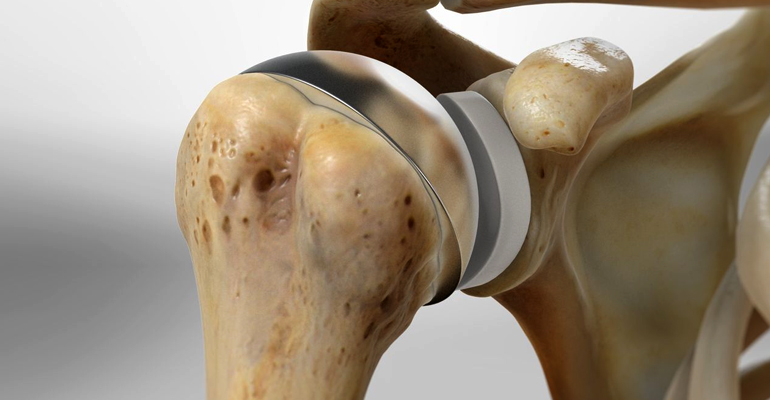-
-
+91-8591556577
-
Shoulder Replacement Surgery

Shoulder Replacement Surgery
Shoulder replacement surgery, or shoulder arthroplasty, is a procedure that involves replacing the damaged parts of the shoulder joint with artificial components (prosthetics). This surgery is typically recommended for patients suffering from severe shoulder pain and limited mobility due to arthritis, injury, or other degenerative conditions. The goal of shoulder replacement surgery is to restore function, alleviate pain, and improve the patient’s overall quality of life.
When is Shoulder Replacement Surgery Needed?
Shoulder replacement surgery may be necessary when conservative treatments no longer provide relief. Common conditions that may require this surgery include:
- Osteoarthritis: Degenerative arthritis that wears down the cartilage in the shoulder joint, leading to pain and stiffness.
- Rheumatoid Arthritis: An autoimmune condition causing inflammation of the joint lining, resulting in pain, swelling, and joint damage.
- Post-Traumatic Arthritis: Arthritis that develops after a shoulder injury, such as a fracture or dislocation, causing joint degeneration over time.
- Rotator Cuff Tear Arthropathy: A severe rotator cuff tear that leads to arthritis and joint damage, making the shoulder weak and painful.
- Avascular Necrosis: A condition where the blood supply to the shoulder joint is disrupted, causing the bone tissue to die and the joint to deteriorate.
- Severe Fractures: A complex shoulder fracture may require surgery, especially in older patients where bone healing is difficult.
Types of Shoulder Replacement Surgery
- Total Shoulder Replacement (TSR): This procedure involves replacing both the ball (humeral head) and socket (glenoid) parts of the joint with prosthetic components. It is used for patients with severe arthritis or joint damage.
- Partial Shoulder Replacement (Hemiarthroplasty): In this procedure, only the ball of the shoulder joint is replaced, which may be suitable for patients with damage limited to the humeral head.
- Reverse Shoulder Replacement: In cases where the rotator cuff is severely damaged or non-functional, reverse shoulder replacement is performed. This procedure reverses the normal anatomy of the shoulder, allowing the deltoid muscle to take over the function of the rotator cuff.
The Shoulder Replacement Procedure
The procedure typically follows these steps:
- Preoperative Evaluation: Your surgeon will assess your shoulder joint, perform imaging tests like X-rays or MRIs, and discuss the most appropriate surgical option based on your condition.
- Surgical Procedure: During the surgery, the damaged parts of the shoulder joint are removed. Prosthetic components made of metal, ceramic, or plastic are then implanted to restore smooth movement and function.
- Postoperative Care: After surgery, a structured rehabilitation program is essential to regain strength, flexibility, and range of motion.
Recovery and Rehabilitation
Recovery from shoulder replacement surgery generally takes several months and involves:
- Hospital Stay: Most patients stay in the hospital for 1 to 3 days following the procedure, during which time pain management and monitoring for any complications are provided.
- Physical Therapy: A critical part of recovery, physical therapy begins soon after surgery to strengthen the muscles around the shoulder, improve mobility, and restore function.
- Home Recovery: After leaving the hospital, patients will continue physical therapy and follow a detailed recovery plan to gradually regain shoulder strength and movement.
- Full Recovery: It usually takes 3 to 6 months to achieve full recovery, although some patients may require longer, depending on their overall health and the extent of the surgery.
Benefits of Shoulder Replacement Surgery
- Pain Relief: The primary benefit of shoulder replacement surgery is the significant reduction or complete elimination of chronic shoulder pain.
- Improved Mobility: The surgery restores normal joint movement, allowing patients to perform daily activities, such as lifting, reaching, and dressing, without discomfort.
- Enhanced Quality of Life: Patients who undergo shoulder replacement often experience a dramatic improvement in their overall quality of life, returning to an active and independent lifestyle.
Risks and Complications
As with any surgery, shoulder replacement carries some potential risks, including:
- Infection at the surgical site
- Blood clots
- Implant loosening or wear over time
- Nerve or blood vessel damage
- Stiffness or limited range of motion post-surgery
However, with proper care and rehabilitation, complications are rare, and most patients experience excellent long-term outcomes.
Why Choose Us for Shoulder Replacement Surgery?
- Experienced Surgeons: Our team of orthopedic specialists has extensive experience performing shoulder replacement surgeries using the latest techniques and advanced prosthetics.
- Patient-Centered Care: We offer personalized care plans tailored to each patient’s unique needs to ensure a smooth recovery and long-term success.
- Comprehensive Rehabilitation: Our dedicated rehabilitation programs focus on helping patients regain mobility and return to their daily activities as quickly and safely as possible.
